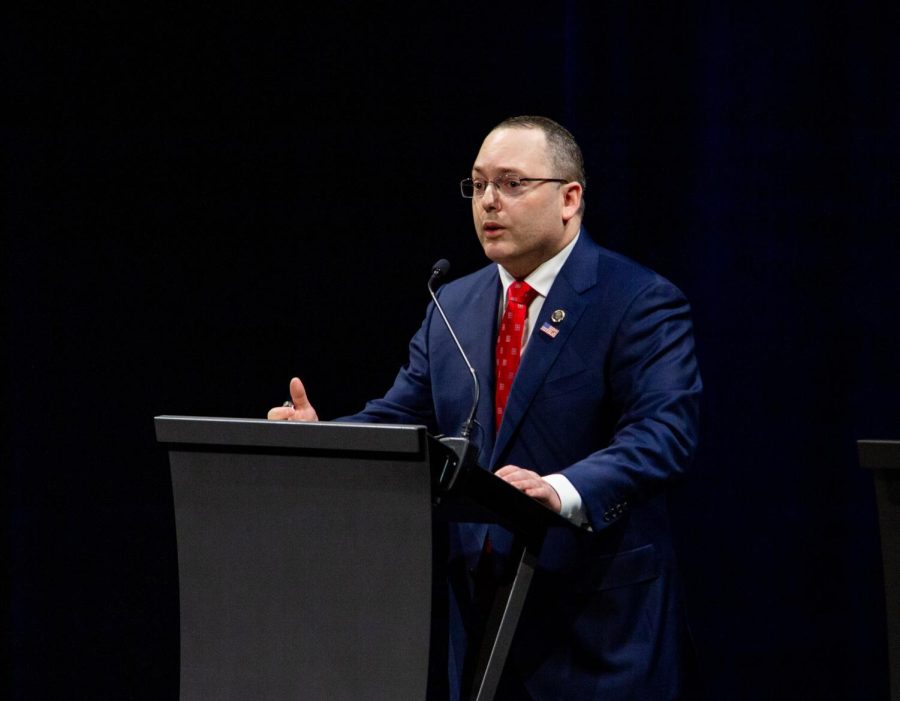The Folly of the “Moderate” Republican
Courtesy of Maria Andraos/Villanovan Photography
Everett Stern’s debate performance showed the grim state of the “moderate Republican.”
March 16, 2022
Two weeks ago, Villanova’s campus became a site in the nationwide battle for the essence of the Republican Party. The Performing Arts Center hosted the latest debate in an increasingly contentious GOP primary race for the Pennsylvania Senate.
The debate was billed as the long-awaited first confrontation between frontrunners TV health guru Dr. Mehmet Oz and hedge fund CEO Dave McCormick, who had thus far only sniped at each other across the airwaves.
But the collision we expected to witness on the Villanova stage was abruptly delayed yet again when Oz, McCormick and former ambassador Carla Sands all swerved at the last minute, choosing to sit the debate out.
The remaining candidates were, in order of poll rankings, businessman and 2018 lieutenant governor candidate Jeff Bartos, veteran and professor Kathy Barnette, attorney George Bochetto and private intelligence agency owner Everett Stern.
The benching of the top three contenders denied us the opportunity to better parse who has what it takes to capture the PA Senate nomination (and the added comedy of watching two frontrunners claw each other’s eyes out).
However, the JV-squad debate we got instead was arguably more valuable as a lens through which to examine the internal strife that has pervaded the Republican Party in primaries across the nation as it attempts to establish a coherent post-Trump identity.
Policy-wise, it was less of a debate and more of a synchronized chorus. Stating that America must drill and frack with abandon, aggressively and militarily counter foreign adversaries and expand policing and border enforcement were uniform positions across the stage, virtually without dissent.
The main source of friction was not ideological but a question of the party’s culture.
It is here where Everett Stern, the stammering “intelligence director” of private agency “Tactical Rabbit” became the heel of the evening. To Stern, a self-described “moderate, common-sense Republican,” the single greatest threat to the nation is the Republican Party itself.
Bedeviled by the sinister swell of “right-wing extremism” that cropped up in the wake of Trump’s election and reached its zenith during the Jan. 6 Capitol riot, Stern has declared himself a martyr for decency and compromise in a party that he feels has forsaken him.
To that end, he directed most debate questions about societal issues back to a myopic thesis: “Right-wing extremism has to be eliminated.”
However, every attempt to goad his opponents into engaging failed, and the audience grew increasingly hostile. Near the debate’s end, he took one last stab at Barnette as she attempted to brush him aside.
“You attacked the Capitol, Kathy,” he mewled. “You committed treason.”
“Shut up, Stern,” a voice from the audience called out.
It’s easy to attribute this disastrous showing to Stern’s uniquely repellent stage presence. He somehow managed to simultaneously oscillate between aggression, sanctimony and timidity. Compared with the other candidates’ sound-bite ready bromides, he seemed to flail like a 16-year-old trying to talk his way out of a speeding ticket.
The tarring and feathering of Stern on the Villanova stage is just one demonstration of “moderate” Republicans’s fate in this age of heightened froth and fervor. After upwards of six years of being tied to Trump, most Republicans have correctly sussed out the direction of the currents in their pool of voters.
Trump is still the favorite for the 2024 nomination and his endorsement, as a poll from Texas shows, is one of the biggest factors driving support in congressional primaries. Moreover, his claims of election fraud are endorsed by many Republican primary voters. One Ohio poll found that 60% believe the election was stolen while only 8% believe there was “no fraud.”
Many elected officials who have not endorsed Trump’s election fraud claims have kept their mouths shut about it or not run for re-election, as Pat Toomey did to open up PA’s Senate seat. Those who have doubled down on their opposition, like Justin Amash, Cheney and Adam Kinzinger have either left or been officially censured by the party.
This is all troubling for democracy, as Stern rightly points out. But he fails to provide any tangible explanation of how he and other moderates differ from the rest of the party on matters that actually impact voters’ lives.
The fact is that Stern’s policy positions on oil drilling, the military, the economy, policing and so on are virtually indistinguishable from those of his more extreme colleagues.
When he harkens back fondly to “The Republican Party of 20 years ago,” is he talking about the compassionate doves who invaded Iraq and Afghanistan, or the stewards of justice and liberty who wrote the Patriot Act?
Stern’s failure runs deeper than his inability to communicate. He and fellow moderate Republicans are becoming obsolete because they have virtually identical beliefs to hardcore Trump fanatics while also acting embarrassed to be associated with them. At least the Trump people seem like they’re having fun.


